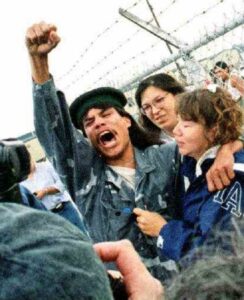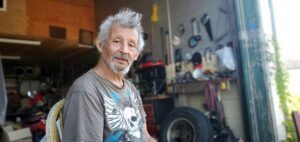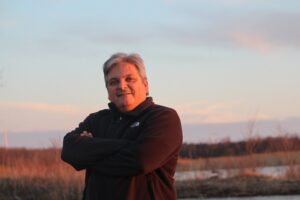Ipperwash Summer Series: Alive for a reason: Talking with Ipperwash survivors about mental health – Part 1
September 6, 2020, will mark the 25th anniversary of the shooting death of unarmed protestor Anthony “Dudley” George by an Ontario Provincial Police sniper at Ipperwash Beach. The Anishinabek News will feature an Ipperwash Summer Series to highlight the history, trauma, aftermath, and key recommendations from the 2007 Report of the Ipperwash Inquiry. First Nations in Ontario understood that the Inquiry would not provide all of the answers or solutions, but would be a step forward in building a respectful government-to-government relationship.
For information on the 2007 Report of the Ipperwash Inquiry, please visit: http://www.attorneygeneral.jus.gov.on.ca/inquiries/ipperwash/closing_submissions/index.html
Warning: This article contains mature subject matter and explicit language. Reader discretion is advised.

By Monica Virtue
Documentary filmmaker Monica Virtue recently met with three members of Chippewas of Kettle & Stony Point First Nation to talk about trauma and mental health surrounding the lived experience of the Ipperwash Crisis.
Perry “Pierre” George, a grandfather of two, shares how he was impacted by the experience of driving his brother Anthony “Dudley” George to the hospital on the night of September 6, 1995, after Dudley had been shot by an Ontario Provincial Police (OPP) sniper outside of Ipperwash Provincial Park. Stacey “Burger” George, a father of two, shares how he was affected by the experience of standing next to Dudley as seven officers opened fire on them and a crowd of fellow land protectors at the entrance of the park. Doug George, the Director of Kettle & Stony Point Health Services, shares his perspective on how the trauma experienced by the survivors of the “Ipperwash Crisis” forms part of the community’s story. While Pierre, Burger and Doug were interviewed separately, their words often echo each other and offer a window into how the community can continue to heal.
On the 25th anniversary of the Ipperwash Crisis:
MONICA VIRTUE (MV): Hearing that it’s the 25th anniversary, what is your reaction to that?
STACEY “BURGER” GEORGE (BURGER): It’s gone by just [snaps his fingers] like that. It’s gone. It seems like it happened yesterday. And if I really think about it — which I don’t want to think about it — that’s all I get. I just block it out of my mind, because if I think about it sometimes I’ll break down. I could break down right now just talking about it.
MV: Pierre said the same thing. He said, “You’ve got to push it to the back…You have to focus on all the good things.”
BURGER: Yeah.
MV: You probably have all had very similar experiences. Do you have any advice for anyone who hasn’t gone on that journey yet? In terms of healing?
BURGER: For me, I literally had to come to the understanding that if I don’t get rid of this hatred I’m carrying, and I don’t change my thinking or my lifestyle, that I am probably going to die. I would probably commit suicide, which I’ve tried so many times. Or drink myself to death, or get in car accidents, or do drugs. I had to overcome all of that. I’m still an addict for drinking. Alright? I’m an alcoholic…When she’s around [motions to his daughter], I’m a sober dad…I had to dig down deep within my soul and say that I want to change my life. I want a better life than this. I don’t want these traumatic experiences to control my mind, and the way I think, and bring me down…There was times that I would just go crazy from thinking…I had to pray. A lot of praying for spiritual help. I had to make up my mind that I needed help, and then go seek it out.
DOUG GEORGE (DOUG): Quite often you’ll hear people say, “I dealt with that. That’s in the past.” But then we might see where somebody pushes that — we call it a “button.” Somebody pushes that button and they react to it, because within our own Indigenous culture…well…If you go to Western school, you’re taught that the mind is the most valuable thing you have. But within Indigenous philosophy, the mind is only one aspect of the whole being. Really, it’s the body that always precedes first before the mind.
People are energy. We’re all energy…The mind only uses what it has experienced in life. It starts utilizing that to make up a story instantly about what’s going on. Sometimes the trauma and the pain we went through, when it gets pulled forward in that instant, somebody who is going through discomfort is re-traumatized. Sometimes that story gets distorted because they haven’t been taught to pay attention to the body and the energy and the spirit. So, they’re cut off from the spirit.
There’s lots of fear that’s attached to trauma. That fear and anger gets stuck in that — we call it heavy energy…When traditional healers work with people, they’re working with spirit and they’re working with a higher, lighter energy.
On crisis counselling:

MV: Pierre, one of the 100 recommendations released by Justice Linden following the Ipperwash Inquiry stated that, “Crisis counselling services should be made available and accessible to individuals who are involved in violent or traumatic events involving police action.” Did the Ontario Provincial Police ever offer you counselling?
PERRY “PIERRE” GEORGE: F**k no. They want nothing to do with me.
MV: Burger, do you remember the first time you were offering crisis counselling?
BURGER: It was after Dudley got shot.
MV: Pretty soon afterwards?
BURGER: It was pretty close; maybe a month later…I tried to go to counselling. And then…I couldn’t do it.
MV: How long did it take before you were able to?
BURGER: I don’t know, because I’ve been to counselling and rehab a lot through my life because of my addiction problems. The traumatic events that I had to go through in my life just kept piling up, piling up, piling up. Right? It’s still piling up. So, it took me a lot to get where I am today. I thank the Good Lord that I had this baby girl [points at his daughter] because she changed my life…I became a very hardcore drug addict and I was dabbling in every drug known to man…And then I changed my life because of her.
DOUG: Our body records everything. Our body holds memory at a cellular level…Within our own Indigenous belief systems and our spirituality, we know that trauma can be passed on in time, to each generation. If you make a choice in life not to deal with your trauma and then you have kids, your kids become receptors for both the resiliency and the trauma together of their parents. They become 50/50 of both mom and dad. And in addition to that, they go through their own life experiences and they may experience their own traumas. If there is previous trauma — historical trauma and pain that was passed on to them — that’s going to get triggered.
The only problem is that a lot of our grandparents don’t talk about the pain and the trauma as a way of protecting us. But we’re already carrying it. So, it shows up in the craziest places.
A lot of people will go through life who have tried to pretend that they dealt with it. I say, “pretend they dealt with it” because they’re very afraid to deal with the trauma and the pain. Especially for a man. A man is socialized now that they have to be very strong and tough. They’re not supposed to cry, and this is very deeply ingrained in men. That permeates all cultures today.
MV: Is that a colonial thing?
DOUG: That’s a colonial thing. So, men are trying to be so strong. If you really understand the process of energy and healing, you can see that’s what’s happening — them trying to pretend they’re so strong. They’re actually showing that they’re very afraid.
On experiencing fear:
MV: Did 1995 set you off on a worse course?
BURGER: Yes. I started drinking more, I started doing drugs more. I was a functional alcoholic or druggie. I worked, but I was basically working for my addictions. As long as rent was paid — it was a free-for-all.
PIERRE: I have a lot of nights where I just feel like something is trying to rip the guts out of my body. That’s how f*****g bad that stuff got. You could be sitting there, and just going, “F**k, I wish I had some f*****g nerve pills or something.” I had nothing. I had to sit there until it finally started to subside. That was an awful feeling. Very bad.
MV: Was it anxiety?
PIERRE: No, it goes way over anxiety…Because I drove Dudley to the hospital. So, I have all of that trauma building up inside of me.
DOUG: The more intense the energy, the deeper the pain and the fear is for people. Because the body holds the memory, the body holds the trauma, the body holds the pain — the mind makes up stories about that. They don’t feel comfortable residing in their body. So, their spirit can’t stay put inside of their body, or it lives outside of their body, or lives close by the body. It jumps in the body when it needs to, but it doesn’t like it in there because it starts to feel. What happens is once they start to feel, they become very afraid. So, what they’ll do is they’ll jump back out again…That’s where you get into people masking trauma through alcohol abuse or drug abuse.
On confronting fear as a community:

MV: What do you think will make things better for people who witnessed Dudley’s death?
PIERRE: Well, that’s something they got to do. They have to do that on their own. If you go to a Healing Lodge, you have to go there for yourself. You don’t go there for your family because it’s not going to work.
MV: Do you think some people haven’t accessed mental health care because they have to go to Kettle Point for it?
PIERRE: I think they just don’t want to face it again — because they’ll have to relive it. But, you know, that’s part of the deal. If you get involved in something like that, you gotta be ready for the aftermath. Because if somebody gets hurt, what happens then is — who knows? All the people will react…I heard the guy [who lives nearby], he was talking…He said some stuff that was hard to take. But the thing is, he wouldn’t go for no counselling. So, they’re just going to have to learn to live it. Me, I’m not gonna. Me, I was put in a very different place that night. You, know? Well, like I says though, they gotta take that step themselves.
DOUG: With our own people, when we’re processing information like that, it usually comes out in story. It’s much safer for people to tell the story. And it’s even more profound if they’re able to tell their story to another individual or group of people…But in the process of telling their story, it’s going to awaken that energy.
What they don’t realize is when awakening the energy, they need to let the energy move up and out. It’s kind of like a snake coming alive. It starts to move like this [motions with his hands] and then it starts moving through the body. Our Elders say it usually picks spots where we have weak points in our body…People will feel the butterflies, or the heart racing, or they may find they are unable to talk. But it is merely energy moving out of the body, and that’s allowing the body to heal in the way that it wants to heal.
Some people shake and cry. Some people think shaking and crying is a bad thing, but it’s just the way the body is processing energy. And that’s fear, right? Some people, what they’ll do is their knees and their feet go up and down. They want to run. You’ll see them start moving their legs because it’s starting to get uncomfortable.
Just like what you were telling me about bringing up the Ipperwash incident to people and then, although that happened so many years ago now, just talking about it after all these years is pushing the energy in people’s bodies. They might not even have been in Ipperwash, but just the story alone is getting their own traumas moving.
BURGER: A few years ago, I went to counselling down here [at Kettle Point]. They were doing a program. And we had to do a Photo Voice and take pictures of different things in my life. And then I had to do a presentation. And when I came to do the presentation, I couldn’t do it. So, I got one of the ladies, one of the counsellors, to get up and present it.
MV: I think I’ve seen it over there at the Health Centre.
BURGER: Yeah, that’s part of it…about my life journey through my childhood. Different circumstances growing up…I had a very traumatic life. I did. Since I was a kid. I was going through a lot of things from seeing a lot of deaths, being sexually abused, and then growing up as a teenager and having these feelings. As a teenager, I went through this suicidal phase where I tried to kill myself so many different times — but I’m alive for a reason because I couldn’t kill myself. I tried, and tried, and tried. Look, see. [Holds out his arm.] I got scars from, from — you know? I tried and tried and tried to overdose, shoot myself, and slice my wrists. I went through a very deep, dark, suicidal phase in my teenage years. And then I think the Ipperwash Crisis was probably the most traumatic experience that I’ve been in my life because I literally got to witness it all.
I was the one that found Dudley. He was all curled up in a ball. The last words he told me was, “They got me.” And I had to yell, “They shot Dudley!” I just sat in the sand in shock. I watched them literally pick him up and take him away, and that’s the last time I seen him. And I watched the police beat up my brother, Slippery. They clubbed and dragged him right down the road. I didn’t know that was him until later. My other brother Jeremiah was there, and I lost him. I didn’t see him until the next day. But in all my traumatic experiences, that was probably the worst one to deal with and let go. I went through a lot of counselling after that.
It was probably in the last 10 years when I finally started going to Red Path. Red Path was the first counselling that I actually finished. I put my whole heart and my soul and my effort to do it. I took Red Path in Sarnia because I didn’t want nobody on this Reserve [at Kettle Point] to hear what I had to say. So, I went to strangers so I could talk about it. Even that time I couldn’t finish it. And then I tried it again maybe five years ago. I actually got my Red Path diploma. I felt better for talking about traumatic experiences and the sexual abuse. I just came to a point where I say, “I don’t care no more — you want to hear this story? I’ll tell ya.” And I came to a point where I can now freely cry — because as a child I was taught not to cry. “You’re a man, and men don’t cry.” But now I’m a crier.
I’m at the point now where I could actually talk about things — about being sexually abused, about Stony Point, about different things. I was just in some pretty hairy, scary stuff with being at the wrong place at the wrong time and guns are pulled out. Right? That’s scary.
DOUG: When we ask younger community workers, “So how do our people heal?” they’ll say, “Oh, we’ve got to make them an appointment with a professional mental health counsellor.” But when we ask our Indigenous Elders, they’ll say, “Through spirit, through song, through ceremony.”
We want people to be able to unburden themselves. We want people to be able to cry. We want people to be able to tell their story in ceremony. The reason why they say “ceremony” is because they’re also initiating a call for our ancestors to come join that person at that time. Even though there might be only two or three people at that particular ceremony when they call ancestral lines in, they’re calling the same people who passed down some of the trauma.
What they say about us is that if you really want to do something to help your ancestors, heal yourself. In healing yourself, you create a passageway for a clearer connection to your ancestors. And that makes them happy. In so doing, then you could feel that happiness yourself.
Ipperwash Summer Series: Alive for a reason: Talking with Ipperwash survivors about mental health – Part 2 available August 28.
Monica Virtue is a settler from Woodstock, Ontario. She is a treaty researcher and documentary filmmaker who holds a Master of Design in Digital Futures from OCAD University in Toronto. She is currently producing a true-crime docu-series about the Ipperwash Inquiry, as well as a 360-documentary about Indigenous waterways with the Public Visualization Lab.


